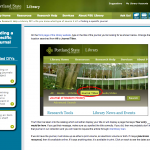I’m not a hero. I’m not an open access warrior. I’m not one of those people who would risk their career on the cross of Open Access. I’m not a badass who makes demands of publishers. I ask nicely. I’m on the tenure track and the idea of walking away from an opportunity to publish is terrifying.
But, you know what? You can find all of my writing (other than what’s on this blog) in PDXScholar, our institutional repository (IR). Want to read my peer-reviewed articles? My American Libraries columns from the past few years? The book chapters I’ve written since 2008? They’re all in there. My most recently article, co-authored with Lisa Hinchliffe and applying a management model to building a culture of assessment where librarians have faculty status, is in an open access journal. And I honestly didn’t think this was particularly notable these days until I read Barbara Fister’s not-at-all-cranky column in Library Journal on making our work freely available and post on Library Babelfish on tenure and the common good.
Apparently a bunch of people told Barbara on Twitter that it’s because of tenure that people aren’t making their stuff open or aren’t fighting for it. I’ll tell you something: what I did was by no means a Herculean task. In most cases, I was allowed via the standard contract to publish my work in my institutional repository. In some cases, I had to use my own ugly copy, but in others, I could use the one from the publisher. In the case of one book chapter, I had to ask for a different contract, but I got it. And the contract they gave me actually allowed me to do whatever I wanted with the chapter (publish in an IR or on my blog, put it on a billboard, etc.). But when I asked the publisher for a digital copy to put in my IR, they told me there was an embargo until I showed them my contract (which they had drafted) which showed no such thing. They then asked me a bunch of questions that made it seem like they didn’t have a clue what IRs actually are. When I realized this, it made me wonder how many authors had ever pushed back (and by pushed back, I mean asked). Some of my co-authors in that book are impressive people and I’m surprised they didn’t try to get the same deal.
Yes, I’ve heard horror stories about dealing with publishers and I totally agree that keeping one’s job is more important than making one article or chapter open. But there are also a lot of fish in the sea, and the number of publishers that don’t allow you to put a pre-print or post-print in an IR (sometimes with an embargo) seems to be dwindling. (Those of you who have a list of acceptable journals that you can publish in to achieve tenure, how many of them don’t allow the deposit of some product in an IR?) Even Elsevier does! And while book chapters are another kettle of fish (I seem to have a lot of fish metaphors going on in this paragraph) there are publishers who will allow you to put a copy of your work in a repository. For me, at least, it’s not necessarily about publishing in OA journals, but about making your scholarship more widely available.
On the other hand, I see so many people who could post pre-prints, post-prints, etc. not doing it and I really don’t understand why. I’m creating a new course for San Jose State’s SLIS program on embedded librarianship (more about embedding the library into the fabric of higher ed than just embedding a librarian in a class, though that’s included too) and I’ve been looking for great articles and book chapters related to my topic. For every book I’ve looked at, I’ve found one or two (at most) chapters in institutional repositories that I can easily link to. Of course they are rarely the ones that I most want to use, and I’ll be damned if I’ll make poor LIS students buy a book from which they’re going to read three chapters. If those authors were able to publish in their IR, why not the rest? Did they not ask or does their contract allow them and they just didn’t bother? My contract with ACRL for a book chapter in 2007 had a provision allowing for publishing in an IR (I believe after an embargo period), and I’m assuming that hasn’t changed since I’ve seen more recent ACRL chapters in IRs.
What’s up with that? Is it that difficult at other places to get your stuff into your institutional repository? What kind of role models are we being if we don’t make available those works we can in the IR? How can we expect disciplinary faculty to do it if we don’t? When it comes down to it, don’t we want to advance knowledge? I know, plenty of people write only for the purpose of getting tenure, but if you’ve put forth the effort already and can make it available to anyone who wants to read it, why wouldn’t you?
You can tell by the title of this blog that I believe in making information widely available. It’s my passion — from creating wikis to creating a mentoring program to publishing in my IR. I do this because I want to connect people with the information they need to be successful, be it from an article or another person. I hate the idea that I might know something that could help someone and didn’t make that information as accessible as possible. Library DIY is essentially a librarian brain-dump that makes us more accessible to our users without them needing to ask for help.
Until I came to Portland State, I had never read an issue of portal. I’d hear about good things in it from blogs, but Norwich didn’t subscribe. Every once in a while I’d find an article in a repository or on the lovely Megan Oakleaf’s website, but I wasn’t going to burden ILL for an article that wasn’t essential to my scholarship. It’s easy to forget when you’re working at a big research university that the vast majority of people in our profession globally do not have access to the scholarship of our profession. I want the solo academic librarian in Vermont and the library school student in Bangladesh to have access to the same wealth of professional information that I have. I see access to information as a social justice issue.
There’s also a purely self-interested reason to get your scholarship out beyond the walled garden of journals and databases: exposure. Tenure track faculty not only need to show productivity; they need to show impact. The more accessible your scholarship is, the more likely people are to read it and (hopefully) cite it. Kristin Antelman (thanks for putting this in a repository!) showed that “freely available articles do have a greater research impact.” In my annual P&T reviews, I include how many times people have downloaded my work in PDXScholar and I’d like to believe it matters that my article on “Participatory Technologies, Pedagogy 2.0 and Information Literacy” was the third most downloaded article in our repository. Even for people who could access your article through a database, the extra steps of logging into the proxy server and navigating to it might just be enough of a barrier for them not to bother.
I guess the proof will be in the pudding. We’ll see in a few years if I get tenure. But if I don’t, it probably won’t be about my scholarship. I haven’t broken any rules or done anything extraordinary. I just made a small amount of effort to make my scholarship open to all. I don’t expect anyone to jeopardize tenure to make stuff more open, but it does disappoint me that people in our profession won’t ask a publisher for permission or even take the time to put something in their IR that could benefit so many. Mostly I just don’t understand why one wouldn’t if they could.
Here’s to breaking down barriers to information. Happy Open Access Week!







Great post, as was Barbara’s. These are topics near and dear to me, since I am also a librarian on the tenure track, and I have two book chapter acceptances in progress whose collections are still being shopped around to publishers.
Which brings me to my 1st question for you or anyone else following this conversation: Who is the contact to reach out to to negotiate a contract that will allow me to make my work openly accessible — the editor(s) (usually fellow librarians) of the book/journal, or someone at the publisher, and if so who exactly? In other words, do these requests go through one’s editor, or are they negotiated directly between author and publisher? (Same question applies to the “reaching out after you’ve already signed away your copyright on past publications (alas) to get the permission or clarification needed in order to make past work openly accessible” scenario.)
And my second question is easiest formulated in response to this part of your post:
“It’s easy to forget when you’re working at a big research university that the vast majority of people in our profession globally do not have access to the scholarship of our profession. I want the solo academic librarian in Vermont and the library school student in Bangladesh to have access to the same wealth of professional information that I have.”
Alternately but very similarly, many of us not working at large research universities *also* don’t have institutional repositories in which to deposit our work. I was looking at the copyright agreement for a journal I’ve published in, and it seemed to say that the pre-pub version of the work could be uploaded to one’s IR, but *not* to subject repositories (those vast things out there run by OA folk where you’re putting your work in a place where practioners in that field might find it). Does someone like me, whose school does not have an IR, only really have as an option to upload my work to my personal website? (Something I’d want to do anyway, but it’s certainly not the best way to make it findable by others in the field.)
I started putting my stuff online linked through my online CV hosted at my college. We only recently launched an IR and it’s still pretty much in the beta phase. I think publishers may be getting more restrictive than they were in the past, now that they are sensing ways of cashing in on author fees (thank you, Finch Report) but I have become choosier about where I publish.
ACRL has good author terms for their books (and other publications). Last year an essay of mine was published in a collection put out by a commercial publisher. I first asked the editor whether I could deposit a version and she didn’t know – didn’t actually have a contract in hand herself and hadn’t asked. I decided to wait and see what the language was, gearing up for a fight, but happily the publisher did not demand the copyright and included language that didn’t specify IRs or deposits but was pleasantly non-exclusive. So I didn’t have to test my negotiation skills or my resolve to pull out if the terms were unacceptable. The odd thing to me was that none of the other contributors seemed the least bit curious about doing this, even though the editors are at universities that have good OA infrastructures. I guess it’s still a bit of a foreign concept in much of the humanities. The book is quite good, I think, and had terrific editors who really made us improve our contributions, but according to Worldcat it’s in 52 libraries worldwide. Lots of effort for very few likely readers (given its price of over $100 makes it unlikely to be a personal impulse purchase). This kind of institutionalized neglect breaks Ranganathan’s third law of library science and ought to be a felony.
For what it’s worth, I know scholars who are blithely ignorant of the rights they’ve given away, but post all of their stuff online anyway. Publishers haven’t gone after them, but I wouldn’t recommend that mix of insouscience and ignorance 🙂
Let me just add that I LOVE LOVE LOVE this essay and want every librarian to read it. It’s so sensible and positive and encouraging. Thank you, Meredith.
Well… I think it’s often possible to self-archive, etc. I’m in the happy position of not being an academic librarian and not having to worry about tenure. But I did recently ask the editors of a book (published through Springer) I was considering contributing to if I could get a contract that would allow me to retain copyright, or at least self-archive, or SOMETHING. They looked at me (well, via email) like I was on crack. So… I won’t be writing for that book, because I don’t have to. There’s still a lot of ignorance out there.
Donna – I can only speak to requesting open access during the contract stage. Last year, I was a contributor to an edited book by ABC-CLIO. When we got our contracts, there was no provision for posting to IRs. I asked the editors if this would be possibility, they talked to their contact, and in six weeks or so (just going from memory here – it wasn’t instantaneous but it didn’t take too long) we had a version of the contract that did allow pre-prints to be posted.
After a book has been published, I think your best bet would be to contact someone at the publishing house – perhaps the rep you worked with, if you still have that contact info?
@Donna Thanks for writing! I’ve only written book chapters for books that had already been accepted by a publisher, but you should negotiate your own contract with the publisher (while keeping your editor in the loop). I think how it’s done depends on the situation. For the one I mention in the post, I emailed the editor of the book with questions about the contract I was given and he then got me in touch with the publisher. In some cases, the editors may negotiate a contract, but you are under no obligation to sign the one they negotiated if you’re not ok with the terms. Once you’ve signed your copyright away, you’re pretty screwed, but it never hurts to ask for permission to make it available in a repository, especially if a length of time has gone by after publication. I think the longer ago it was published, the more they would be inclined to let you self-archive it.
As to your second question, when I see an agreement like that, my first response is to ask for an exception. I’d let them know that my institution doesn’t have a repository and can I archive in E-LIS (which I did when I was at Norwich which didn’t have an IR either). It never hurts to ask. But, like Barbara, you could also put your stuff on your own website. It’s less findable, but it is findable (I’ve, in fact, stumbled on some of Barbara’s stuff through Google).
@Laura – I deal with a lot of anthropology faculty who publish through Springer and they seem like the worst when it comes to allowing things to live in a repository. One of my faculty was pissed that her federally funded research could not be made freely available even to the students at her own University. In the end, we bought the book her work was in. 🙁
@Barbara – thank you! I can’t tell you how much your kind words mean to me. You’re one of my professional heroes!
Thank you for the responses and suggestions! I will definitely keep them in mind, and may set a professional goal of a time frame within/by which I will aim to have my past work be made publicly accessible (at least, to have gone through the process of asking, whatever the outcome).
Pingback: Meredith Farkas blogs on Open Access and the tenure track | Collaborative Librarianship News
Let me just add that I LOVE LOVE LOVE this essay and want every librarian to read it. It’s so sensible and positive and encouraging. Thank you, Meredith.
Pingback: Read your contract: Being OA isn’t enough | Information Wants To Be Free